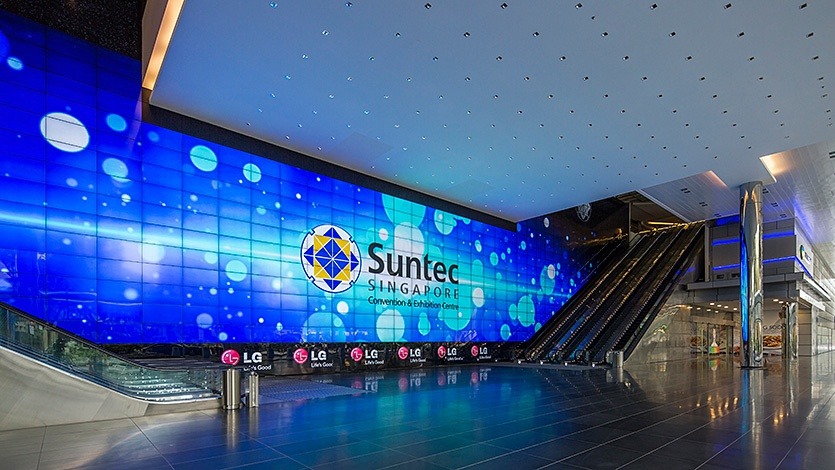Nearly half the workforce of Suntec International Convention and Exhibition Centre (SICEC) will be retrenched.
Suntec Singapore jointly announced the news with the Building Construction And Timber Industries Employees’ Union (BATU) yesterday (28 August).
The convention centre currently employs 178 staff. After the retrenchment exercise, 85 jobs will be lost across the board, comprising 60 locals and 25 non-locals.
Suntec is partnering with National Trades Union Congress (NTUC) and BATU to provide those affected with financial and professional support. The date of notice will be served from next Tuesday.
Blanket Ban On Events In S’pore
Singapore’s Meetings, Incentives, Conventions and Exhibitions (MICE) industry has been decimated by Covid-19.
In February, the United Kingdom’s third person diagnosed with Covid-19 was reported to have caught the disease from Singapore after attending a business conference at the Grand Hyatt hotel.
Since then, all large-scale commercial events have been rapidly deferred or cancelled, and the blanket ban was made compulsory in March.
While the government has reopened the economy in Phase 2, large-scale gatherings are limited to major live events like marriages and funerals, and are limited to 50 people.
The ban on mass gatherings means that revenue stream for events has dried up. Cost-cutting policies have been felt across the board in the MICE industry.
In a survey conducted by the Professional Convention Management Association in Asia Pacific, more than half of the respondents said that decline in revenue would supersede 75 per cent for the rest of 2020.
Singaporean events firms have reported that revenue dropped close to zero per cent as social distancing and travel restrictions crushed plans.
The fallout from the events industry is liable to hurt an entire ecosystem, including “venues, travel, entertainment, media, creative production and design, catering, merchandising.”
Events Are Cutting Costs, Going Digital
Events are also a major draw for other sectors, encouraging cross-cultural tourism, education and professional exchanges, and business opportunities — but all that has died since the onset of Covid-19.
Right now, the MICE industry is in damage control mode.
Since February, Suntec and BATU has worked together to implement cost control measures.
That includes hiring freezes, shorter work weeks, and temporary salary reductions in unpaid leave, with management taking up to 40 per cent in pay cuts.
Other events businesses have adapted to the new normal by switching up their business model and leveraging on tech.
As Clarke Quay falls silent, clubs have turned their spaces into F&Bs in a bid to capture revenue.
Zouk for one, has turned its Capital Lounge in Clarke Quay into a pop-up restaurant called Capital Kitchen about two months ago, while Ce La Vi’s SkyBar at Marina Bay Sands has been turned into a dining concept called Bao.
Similarly, the Timbre Group has started live-streaming its gigs. Other major music events are turning to online concerts to replace physical raves.
PouchNATION, originally an events solution provider, is turning to hybrid-digital events and launching temperature-taking wristbands.
For hackathon events organiser Startup Weekend Singapore (SWSG), they were forced to throw together a digital hackathon in just 16 days, which saw a record-high turnout in April.
Fall Of A MICE Giant?
Support for the MICE industry is extensive, and the SICEC’s inability to retain workers is symptomatic of a failing sector.
The Jobs Support Scheme (JSS) has provided workers in the MICE industry Tier 1 support, where the government will subsidise up to 75 per cent of the first S$4,600 of workers’ wages.
Coupled with the new property tax reliefs, MICE properties like SICEC can receive up to 100 per cent of property tax rebates.
However, without any revenue to speak of, there’s little relief to be had.
SICEC was built to be the premier convention and exhibition centre in the Asia Pacific, and has lived up to its name.
The convention center has won awards year on year, and hosted everything from the 2010 Youth Olympic Games, Anime Festival Asia, to the COMEX and IT Show events in 2017.
It’s one of the largest and most modern convention facilities in the Asia Pacific, spanning over 42,000 square metres. Between 2012 to 2014, the convention centre even underwent a S$410 million facelift.
Unfortunately, the Suntec Real Estate Investment Trust (REIT) reported a drop in gross revenue by 3.1 per cent year-on-year, mainly due to lower event engagements in SICEC.
For a premier convention center to cut more than half of its workers, it means that there may be a limit on the extent to which the MICE industry can ‘pivot’.
The human touch can be digitised, but it can’t be replaced. That might mean that until a vaccine for the virus is found, the MICE industry will have to tread shark-infested waters.
Featured Image Credit: Goody Feed
Also Read: The Show Must Go On: How These S’pore Events Firms Are Tapping On Tech To Survive Covid-19
